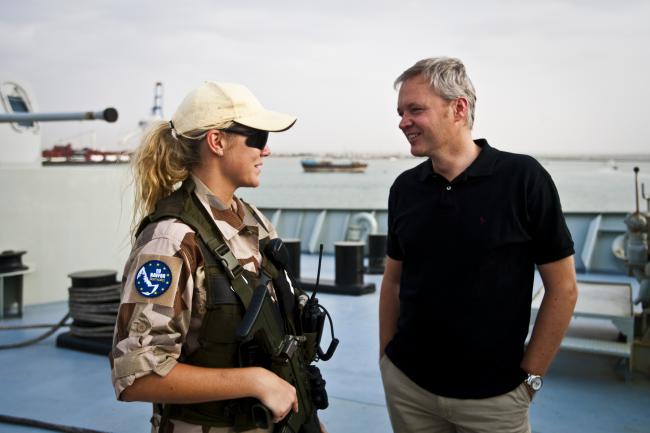On 12 of August the Swedish Minister of Defence, Sten Tolgfors visited EU NAVFOR’s Swedish warship HSwMS CARLSKRONA in Djibouti.
The Minister received a presentation about the European Union mission, Operation ATALANTA from the present EU NAVFOR Force Commander Rear Admiral (LH) Jan Thörnqvist. He also met and thanked the Swedish sailors and soldiers onboard and stated: “Sweden supports the important objectives and tasks of EU NAVFOR Operation ATALANTA. I am very proud that Sweden is a participant within EU NAVFOR and also the excellent performance made by our sailors and soldiers”.
Minister Sten Tolgfors then stated that: “Sweden is taking part in Operation ATALANTA to fight piracy for two reasons. First, from a humanitarian perspective by protecting UN food supplies, thus supplying about 1.5 million internally displaced persons in Somalia. The second reason is that it is in Sweden's interest to keep the trade routes by sea open. It would have a significant impact on the European economy if shipping would be prevented from using the Suez Canal and instead be forced to transit around the southern part of Africa”.
The Minister received a presentation about the European Union mission, Operation ATALANTA from the present EU NAVFOR Force Commander Rear Admiral (LH) Jan Thörnqvist. He also met and thanked the Swedish sailors and soldiers onboard and stated: “Sweden supports the important objectives and tasks of EU NAVFOR Operation ATALANTA. I am very proud that Sweden is a participant within EU NAVFOR and also the excellent performance made by our sailors and soldiers”.
Minister Sten Tolgfors then stated that: “Sweden is taking part in Operation ATALANTA to fight piracy for two reasons. First, from a humanitarian perspective by protecting UN food supplies, thus supplying about 1.5 million internally displaced persons in Somalia. The second reason is that it is in Sweden's interest to keep the trade routes by sea open. It would have a significant impact on the European economy if shipping would be prevented from using the Suez Canal and instead be forced to transit around the southern part of Africa”.
